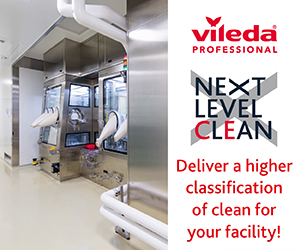Working in a cleanroom can be characterised as a marathon, not a sprint. So, it is important the protective equipment worn by cleanroom professionals is able to go the full distance and reduce risk of any exposure – including on the skin.
Providing the necessary level of protection required is imperative for worker safety, in addition to ensuring one’s ability to work for long periods of time without experiencing skin irritation or the need to continually don new protective equipment.
In cleanroom environments, special attention should be paid to gloves, as almost all International Organization for Standardization (ISO) cleanroom classes require them. They are also the piece of personal protective equipment that covers the part of the body closest to the given product and working surfaces.
Luckily, there are a number of alternatives available for those prone to allergies to help keep their skin healthy while they perform their jobs. This includes accelerator-free gloves
While many industries have moved away from latex gloves, latex is not the only common glove allergy of which cleanrooms should be mindful. Accelerators are often used as part of the cleanroom glove manufacturing process to help stabilise the raw materials to form a strong, elastic product through a rapid vulcanisation of the polymers in nitrile or other non-latex exam gloves.
These accelerators, which are used to produce many non-latex gloves, can cause Type IV allergies, also known as a hypersensitivity reaction.
This is an inflammatory reaction the body produces when exposed to certain allergens or accelerants. In the case of gloves, the skin is in constant contact with the gloves’ material – making it critical to ensure protective equipment meets the needs of those wearing it. Natural rubber or sulphur-based chemical accelerators in non-latex gloves (predominantly thiazoles, thiurams and carbamates) can cause allergic contact dermatitis (a common Type IV allergy), resulting in dryness or a rash with bumps or blisters that can impact the ability of cleanroom staff to do their job properly and comfortably. According to the CDC, cases of contact dermatitis account for 10-15% of all occupational illnesses and can lead to an estimated annual cost exceeding $1 billion.
For a clinician in a healthcare setting who changes gloves each time they enter an exam room, this may not be an issue. However, for cleanroom employees who need to wear the same pair of gloves for an extended period of time, a reaction to the chemical accelerators can build up, especially for those with Type IV allergies.
In addition, skin conditions like eczema can not only cause pain, but also infections or complications that can impact performance on the job.
Luckily, there are a number of alternatives available for those prone to allergies to help keep their skin healthy while they perform their jobs. This includes accelerator-free gloves.
In one study focused on healthcare workers with hand eczema, all who switched to accelerator-free gloves improved their situation, and two thirds of patients were completely free of symptoms. Cleanroom professionals should be comfortable and have confidence in their PPE to do their jobs well, especially given that there is little room for error or exposure in their working environments.
Similar to how glove manufacturers and healthcare systems adapted to meet the needs of those with latex allergies by providing latex-free products, manufacturers have developed cleanroom gloves to meet the needs of those with Type IV allergies and sensitivities to latex or chemical accelerators. Brands, like Owens & Minor’s HALYARD (registered trademark) product brand, have developed and currently offer accelerator-free cleanroom gloves with low dermatitis potential.
These gloves provide the same level of protection as traditional cleanroom gloves – recommended for use in ISO Class 3 cleanrooms or higher – and offer effective barrier protection against chemical splash, microorganisms and viruses while still allowing for the flexibility and comfort needed to be worn over long periods of time.
The work done in cleanrooms is important and highly specialised, and those working in this industry deserve comfort in their gloves.
Accelerator-free cleanroom gloves, like HALYARD PUREZERO Nitrile Gloves, provide employees with the high level of barrier protection needed while reducing the risk of allergies and skin irritation; thus, allowing workers to focus on the job at hand, rather than what is on their hands.





